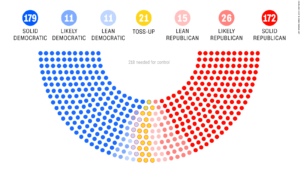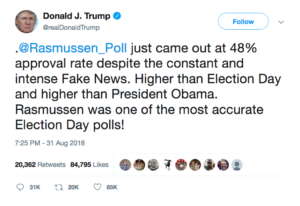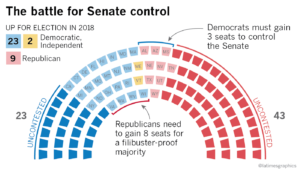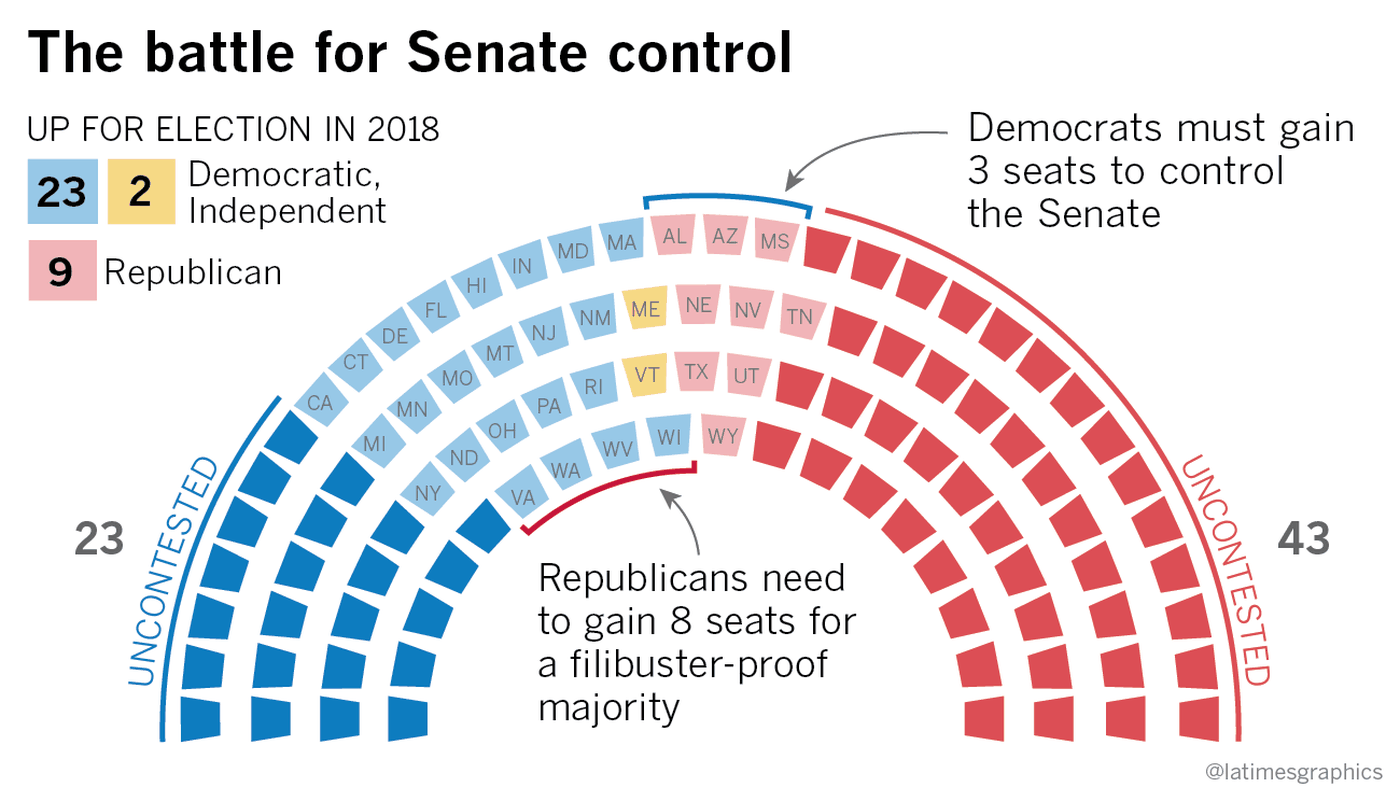With the midterm elections less than two months away, (here’s a countdown link), a barrage of political assessments arrives daily, as it will no doubt until November 6. Various observers have commented on the importance of Donald Trump in this election, and Dana Milbank, writing in the Washington Post on September 14, supported this assessment with persuasive data. In “The Trump Albatross,” he concluded “New evidence indicates that the midterm elections in seven weeks will be the clearest referendum on a president in at least 80 years.”
The current opinion polls are not encouraging to Republicans–except to those of us who have concluded that a “Blue Wave” is necessary not only for the good of the country but for the survival and ultimate restoration of the Republican Party. The consensus today is that Democratic control of the House seems likely and that even control of the Senate may be within reach.

At the end of August, our irrepressible President found a bright spot in a poll by his favorite pollster, Rasmussen, and proudly tweeted that “@Rasmussen_Poll just came out at 48% approval rate, “higher than President Obama.” Trump’s citation to the Rasmussen poll of August 31 was accurate although Rasmussen was an outlier, with all other polls collected by RealClear Politics (RCP) showing a lower average approval rating of 42.8%. Trump’s reference to Obama was not accurate as, in fact, Obama had the same approval rating on August 31, in 2010. And that should hardly have been comforting to Trump since the 2010 elections following that August 31, 2010 poll produced massive Democratic losses, yielding to Republicans control of the House and sharply narrowing the Democrats’majority in the Senate.  The following two weeks were not kind to the President, witnessing among other things the Cohen guilty pleas and Manafort’s conviction in Virginia, as well as Bob Woodward’s book, Fear, and the anonymous op-ed in the New York Times, both vividly describing chaos and conflict in the White House. As of September 14, the Rasmussen poll had slipped by a point to 47% approval (with 51% disapproval), but other polls had also declined to an RCP average of 40.9% approval (and 53.4 disapproval). In terms of the Generic Congressional Vote, Rasmussen showed a preference for Democrats over Republicans by 46% to 42% and the RCP average showed a larger Democratic edge, 48.8% to 40.5%.
The following two weeks were not kind to the President, witnessing among other things the Cohen guilty pleas and Manafort’s conviction in Virginia, as well as Bob Woodward’s book, Fear, and the anonymous op-ed in the New York Times, both vividly describing chaos and conflict in the White House. As of September 14, the Rasmussen poll had slipped by a point to 47% approval (with 51% disapproval), but other polls had also declined to an RCP average of 40.9% approval (and 53.4 disapproval). In terms of the Generic Congressional Vote, Rasmussen showed a preference for Democrats over Republicans by 46% to 42% and the RCP average showed a larger Democratic edge, 48.8% to 40.5%.
On September 13, Sabato’s Crystal Ball included four separate analyses which were summarized by a guest columnist:
This is likely to be a very good year for the Democrats in the House of Representatives. In fact, all four forecasts expect a Democratic House majority. In the Senate, Republicans are likely to hold their own and perhaps pick up a seat or two.
The more favorable outlook for Republicans in the Senate stems basically from the fact that Democrats hold more seats that are up for reelection and at risk than do Republicans. Nevertheless, a respected observer, Stuart Rosenberg, published a detailed analysis in Roll Call on September 12 supporting his view that the Senate is now in play. He conceded, however, that the path to Democratic control of the Senate is a “very narrow and rocky one.”

Some voices of mild optimism for Republicans come from the Wall Street Journal which, though sharply critical of Trump’s policies on trade and immigration, and his personal antics, is enchanted by tax cuts and deregulation and seems determined to support him whenever it can. In a September 12 op-ed in the Journal, Karl Rove cautiously observed that “The polls have been swinging back and forth all year, and Republicans are now having their turn in the barrel. The question is whether the polls swing again so that Mr. Trump’s numbers rise and the generic ballot tightens before Nov. 6.” On September 13, the Journal’s Kimberley Strassel wrote a column “How Republicans Could Still Win.” Analyzing a poll by WPAi or the Club for Growth but not yet made public, Ms. Strassel advocated a strategy in which the Republican message would be exquisitely tailored to individual districts. She concluded, “Elections during the Trump presidency, like the presidency itself, will be messy. Republicans who are willing to embrace that mess still have a shot.” Hardly a ringing call to arms.
While one cannot predict what the next seven weeks might bring, it is difficult to imagine anything happening to materially improve Republicans’ general standing. Their principal, and arguably their only, political asset for voters outside Trump’s shrinking base is a strong economy. But the economy it is unlikely to get significantly better between now and Election Day in terms of stock market averages, employment, or wages. Put another way, whatever credit Trump is entitled to for the economy—and that can be vigorously debated—it is already baked in the cake. Ms. Strassel appeared to place great hope in a bill introduced by Rep. Kevin Brady to extend the individual tax cuts in the 2017 tax reform bill. That hope, however, may be misplaced. As reported by Emily Stewart in Vox:
Polls show many Americans aren’t noticing tax cuts in their paychecks, and the bill has actually become less popular with voters over time. According to a RealClearPolitics average of polling, 37 percent of voters approve of the GOP’s tax cuts, while almost 42 percent disapprove. One Republican strategist recently told me that the party has found taxes are “not as big of an issue as we thought it might have been in January or February of last year.”
There also appear to be few grounds for Republicans to hope for some sort of “October Surprise” that will suddenly demonstrate that, against all evidence, the Chief Executive knows what he is doing. Asylum seekers and their children will remain incarcerated at the border, DACA beneficiaries will continue to languish, and the Trump Wall will be nowhere in sight; the purported “negotiations” with Kim Jong-Un will not ripen into a credible agreement; Russia will decline to restrain either Iran or Syria in the Middle East; new trade agreements are almost certain to remain out of reach; the Mueller investigation will not disappear; if Kavanaugh’s nomination to the Supreme Court is confirmed, it will please and excite Trump’s base, but will leave the rest of the country with attitudes ranging from indifference to dismay. (Even the Kavanaugh nomination, which had seemed unstoppable, has now been complicated by allegations of sexual misconduct in High School.)
On the other hand, there is considerable potential for political conditions to deteriorate for Republicans. The most obvious possibility may be developments in the Mueller investigation, a process that just marked a significant milestone with the agreement of Paul Manafort in the District of Columbia to plead guilty and cooperate with prosecutors. One cannot tell what fruit that tree may bear, or how soon, but news of the Manafort agreement can only be unsettling to Trump and his lawyers. It was, after all, less than a month ago that Trump tweeted an unabashed salute to Manafort for his bravery in having refused to make just such a deal. Other possibilities for political damage may include a growing realization of how many businesses and individuals are hurt by Trump’s feckless tariffs, as well as increasing harm from Trump’s attempts to dismantle Obamacare without replacing it as promised. Then, of course, there is the Trump Twitter account with its almost daily supply of embarrassing falsehoods and petty attacks, a gift that keeps on giving to the media and Democrats.
The next few weeks should be interesting for the strong of stomach.

I have to disagree strongly with Roger Stetter who feels an allegation of wrongdoing should result in the dismissal of Judge Kavannaugh as a potential Supreme Court Justice. Nothing has been proven, and in fact there is much to support Kavannaugh’s claim to innocence. Folks who are eager to throw him under the bus seem to have lost all sense of fairness and just eagerly accepted the political bone thrown to them to stop the nomination at any cost. The hearings were a circus with staged protests that do us no credit, left or right. There are many reasons to be embarrassed by what is happening in Washington these days. The White House surely owns many of them. But they hardly have an exclusive on this.
Thanks for this great post.
The party in power of the White House usually gets beaten in the mid-terns. It will be no different this time.
That being said, one hopes for a huge Blue Wave to teach the Trump defenders a lesson: lie down with dogs, pick up fleas.
The Kavannaugh nomination is of grave concern. If as a 17 year old at an elite prep school he attempted to rape a young woman, covering her mouth to muffle her screams, he should not be on the Supreme Court. I was once a 17 year-old freshman at Cornell at knew that such behavior was cowardly and despicable.
Professor Ford has reluctantly come out with damning evidence against Kavannaugh. The burden is now on him to prove his innocence beyond a shadow of a doubt.
The Supreme Court – not just litigants – will suffer grave harm if a suspected attempted rapist sits on its bench.
The nice thing about politics is that hopes springs eternal, no matter how misplaced.
That Donald Trump is the main issue is obvious. He overshadows everything else, as he wants. The problem for Republicans is that he is toxic for a substantial part of the electorate and becoming distasteful for an increasing number, even if his base holds firm. The last is unfathomable for those who can sign their names in cursive, but that is another issue for another time. As you correctly point out, Doug, there appear to be few events between now and November that are apt to break the Republicans’ way, but there are a number which could break against them. Working for them is the fact that Republicans tend to be more disciplined about showing up at the polls than Democrats. Had the Dems been more disciplined, they likely would have propelled Hillary Clinton to the White House despite how she ran her campaign.
For the Democrats that lack of voting discipline is apt to be their biggest problem in November. Events between now and the election could well break their way, but they should not count on it. As of now it looks as though they will win the House, but the Senate appears to be a stretch.
And this is where it gets to be interesting. If the Democrats do win the House, do they bring impeachment charges against Trump? My thought is that would be foolhardy unless there are realistic reasons. Instead, they should play the loyal if vociferous opposition. No need to rouse the Trump base any more than necessary. Instead, keep him as the cudgel with which to keep beating the Republicans through 2020 and inflict a humiliating defeat on him and them.
If that happens, will he accept the results, or will he attempt to cook up some mendacious reasons for staying in office? One can only imagine that scenario.
As the ancient Chinese curse goes, “May you live in interesting times.”
Thanks Van for your intriguing response to Doug’s post. I think the Democratic turnout will be huge because Trump is so very offensive and undignified . Also because he has attacked so many of our most trusted and important institutions and allies. Would he defy the vote in 2020 and attempt to become president for life? He is a megalomanic and a criminal, so it’s possible. But he would never get away with it. The US Marshall Service would remove him in a straight-jacket if necessary. That would be a joy to behold.
Comments are closed.